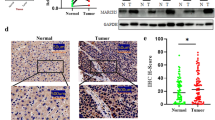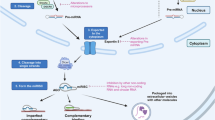Abstract
This study aimed to explore the role of ribosomal protein L8 (RPL8) in controlling hepatocellular carcinoma (LIHC) development. We measured RPL8 expression, apoptosis, cell viability, proliferation, migration, invasion, glucose uptake, lactate production, and the ATP/ADP ratio of LIHC cells to investigate the effect of RPL8 on LIHC. Bioinformatic analysis was employed to analyse RPL8 expression and its potential mechanism in LIHC. RPL8 was upregulated in LIHC tissues and cells. RPL8 silencing accelerated apoptosis and suppressed viability, growth, and movement of LIHC cells. Additionally, RPL8 silencing inhibited glycolysis in LIHC cells. Bioinformatic analysis revealed that RPL8 is regulated by the upstream transcription factor upstream stimulating factor 1 (USF1) and activates the mTORC1 signalling pathway. USF1 overexpression eliminated the inhibitory effect of RPL8 silencing in LIHC cells. RPL8 overexpression increased cell growth, movement, and glycolysis in LIHC. However, inhibition of the mTORC1 signalling pathway eliminated the effect of RPL8 overexpression on LIHC cells. In conclusion, RPL8 may affect LIHC progression by regulating the mTORC1 signalling pathway.







Similar content being viewed by others
Data availability
The datasets used and/or analysed during the current study are available from the corresponding author on reasonable request.
References
Bray F, Ferlay J, Soerjomataram I, Siegel RL, Torre LA, Jemal A. Global cancer statistics 2018: GLOBOCAN estimates of incidence and mortality worldwide for 36 cancers in 185 countries. CA Cancer J Clin. 2018. https://doi.org/10.3322/caac.21492.
Llovet JM, Zucman-Rossi J, Pikarsky E, Sangro B, Schwartz M, Sherman M, Gores G. Hepatocellular carcinoma. Nat Rev Dis Primers. 2016;2:16018. https://doi.org/10.1038/nrdp.2016.18.
de la Cruz J, Karbstein K, Woolford JL Jr. Functions of ribosomal proteins in assembly of eukaryotic ribosomes in vivo. Annu Rev Biochem. 2015;84:93–129. https://doi.org/10.1146/annurev-biochem-060614-033917.
Lin Z, Peng R, Sun Y, Zhang L, Zhang Z. Identification of ribosomal protein family in triple-negative breast cancer by bioinformatics analysis. 2021. Biosci Rep. https://doi.org/10.1042/bsr20200869.
Hanes J, Klaudiny J, Vonderkammer H, Scheit KH. Characterization by cDNA cloning of the mRNA of human ribosomal protein L8. Biochem Biophys Res Commun. 1993;197(3):1223–8. https://doi.org/10.1006/bbrc.1993.2607.
Swoboda RK, Somasundaram R, Caputo L, Ochoa EM, Gimotty PA, Marincola FM, Van Belle P, Barth S, Elder D, Guerry D, Czerniecki B, Schuchter L, Vonderheide RH, Herlyn D. Shared MHC class II–dependent melanoma ribosomal protein L8 identified by phage display. Can Res. 2007;67(8):3555. https://doi.org/10.1158/0008-5472.can-06-2763.
Futschik M, Jeffs A, Pattison S, Kasabov N, Sullivan M, Merrie A, Reeve A. Gene expression profiling of metastatic and nonmetastatic colorectal cancer cell lines. Genome Lett. 2002;1:26–34. https://doi.org/10.1166/gl.2002.005.
Hwang K-A, Kwon JE, Noh Y, Park B, Jeong YJ, Lee S-M, Kim S-Y, Kim I, Kang SC. Effects of Zanthoxylum piperitum ethanol extract on osteoarthritis inflammation and pain. Biomed Pharmacother. 2018;105:481–90. https://doi.org/10.1016/j.biopha.2018.05.109.
Zhang X, Wang S, Wang H, Cao J, Huang X, Chen Z, Xu P, Sun G, Xu J, Lv J, Xu Z. Circular RNA circNRIP1 acts as a microRNA-149-5p sponge to promote gastric cancer progression via the AKT1/mTOR pathway. Mol Cancer. 2019;18(1):20. https://doi.org/10.1186/s12943-018-0935-5.
Ge Y, Li Q, Lin L, Jiang M, Shi L, Wang B, Yang L, Xu Z. Downregulation of NUSAP1 suppresses cell proliferation, migration, and invasion via inhibiting mTORC1 signalling pathway in gastric cancer. Cell Biochem Funct. 2020;38(1):28–37. https://doi.org/10.1002/cbf.3444.
Zhu L, Qin C, Li T, Ma X, Qiu Y, Lin Y, Ma D, Qin Z, Sun C, Shen X, Zhao Y, Han L. The E3 ubiquitin ligase TRIM7 suppressed hepatocellular carcinoma progression by directly targeting Src protein. Cell Death Differ. 2019;27:1–13. https://doi.org/10.1038/s41418-019-0464-9.
Qiu J, Zhang S, Wang P, Wang H, Sha B, Peng H, Ju Z, Rao J, Lu L. BUB1B promotes hepatocellular carcinoma progression via activation of the mTORC1 signaling pathway. Cancer Med. 2020;9(21):8159–72. https://doi.org/10.1002/cam4.3411.
Hu Y-W, Kang C-M, Zhao J-J, Nie Y, Zheng L, Li H-X, Li X, Wang Q, Qiu Y-R. LncRNA PLAC2 down-regulates RPL36 expression and blocks cell cycle progression in glioma through a mechanism involving STAT1. J Cell Mol Med. 2018;22(1):497–510. https://doi.org/10.1111/jcmm.13338.
Daftuar L, Zhu Y, Jacq X, Prives C. Ribosomal proteins RPL37, RPS15 and RPS20 regulate the Mdm2-p53-MdmX network. PLoS ONE. 2013;8(7):e68667–e68667. https://doi.org/10.1371/journal.pone.0068667.
Kondoh N, Shuda M, Tanaka K, Wakatsuki T, Hada A, Yamamoto M. Enhanced expression of S8, L12, L23a, L27 and L30 ribosomal protein mRNAs in human hepatocellular carcinoma. Anticancer Res. 2001;21(4A):2429–33.
Dong Z, Jiang H, Liang S, Wang Y, Jiang W, Zhu C. Ribosomal protein L15 is involved in colon carcinogenesis. Int J Med Sci. 2019;16(8):1132–41. https://doi.org/10.7150/ijms.34386.
Li J, Liu W, Hao H, Wang Q, Xue L. Rapamycin enhanced the antitumor effects of doxorubicin in myelogenous leukemia K562 cells by downregulating the mTOR/p70S6K pathway. Oncol Lett. 2019;18(3):2694–703. https://doi.org/10.3892/ol.2019.10589.
Tian NY, Qi YJ, Hu Y, Yin B, Yuan JG, Qiang BQ, Peng XZ, Han W. RNA-binding protein UNR promotes glioma cell migration and regulates the expression of ribosomal protein L9. Chinese Med Sci J. 2018;33(3):143–51.
Wu H, Qiao M, Peng X, Wu J, Liu G, Sun H, Li L, Mei S. Molecular characterization, expression patterns, and association analysis with carcass traits of porcine USF1 gene. Appl Biochem Biotechnol. 2013;170(6):1310–9. https://doi.org/10.1007/s12010-013-0280-5.
Zhao X, Wang T, Liu B, Wu Z, Yu S, Wang T. Significant association between upstream transcription factor 1 rs2516839 polymorphism and hepatocellular carcinoma risk: a case–control study. Tumor Biology. 2015;36(4):2551–8. https://doi.org/10.1007/s13277-014-2871-3.
Yan H, He N, He S. HCG15 is a hypoxia-responsive lncRNA and facilitates hepatocellular carcinoma cell proliferation and invasion by enhancing ZNF641 transcription. Biochem Biophys Res Commun. 2022;608:170–6. https://doi.org/10.1016/j.bbrc.2022.03.143.
Chen B, Chen X-P, Wu M-S, Cui W, Zhong M. Expressions of heparanase and upstream stimulatory factor in hepatocellular carcinoma. Eur J Med Res. 2014;19(1):45. https://doi.org/10.1186/s40001-014-0045-9.
Chaichanit N, Wonglapsuwan M, Chotigeat W. Ribosomal protein L10A and signaling pathway. Gene. 2018;674:170–7. https://doi.org/10.1016/j.gene.2018.06.081.
Huang Z, Zhang Y, Li H, Zhou Y, Zhang Q, Chen R, Jin T, Hu K, Li S, Wang Y, Chen W, Huang Z. Vitamin D promotes the cisplatin sensitivity of oral squamous cell carcinoma by inhibiting LCN2-modulated NF-κB pathway activation through RPS3. Cell Death Dis. 2019;10(12):936–936. https://doi.org/10.1038/s41419-019-2177-x.
Tandon P, Gallo CA, Khatri S, Barger JF, Yepiskoposyan H, Plas DR. Requirement for ribosomal protein S6 kinase 1 to mediate glycolysis and apoptosis resistance induced by Pten deficiency. Proc Natl Acad Sci. 2011;108(6):2361–5. https://doi.org/10.1073/pnas.1013629108.
Holz MK, Ballif BA, Gygi SP, Blenis J. mTOR and S6K1 mediate assembly of the translation preinitiation complex through dynamic protein interchange and ordered phosphorylation events. Cell. 2005;123(4):569–80. https://doi.org/10.1016/j.cell.2005.10.024.
Acknowledgements
None.
Funding
None.
Author information
Authors and Affiliations
Corresponding author
Ethics declarations
Conflicts of interest
The authors declare that they have no conflicts of interest.
Consent for publication
Not applicable.
Ethics approval and consent to participate
The protocol of this research has been approved by the Ethics Committee of The Second Affiliated Hospital of Zhejiang Chinese Medical University (No: 2021–0108). All patients have signed written informed consent.
Additional information
Publisher's Note
Springer Nature remains neutral with regard to jurisdictional claims in published maps and institutional affiliations.
Supplementary Information
Below is the link to the electronic supplementary material.
Rights and permissions
Springer Nature or its licensor (e.g. a society or other partner) holds exclusive rights to this article under a publishing agreement with the author(s) or other rightsholder(s); author self-archiving of the accepted manuscript version of this article is solely governed by the terms of such publishing agreement and applicable law.
About this article
Cite this article
Sun, T., Zhu, W., Ru, Q. et al. Silencing RPL8 inhibits the progression of hepatocellular carcinoma by down-regulating the mTORC1 signalling pathway. Human Cell 36, 725–737 (2023). https://doi.org/10.1007/s13577-022-00852-9
Received:
Accepted:
Published:
Issue Date:
DOI: https://doi.org/10.1007/s13577-022-00852-9




